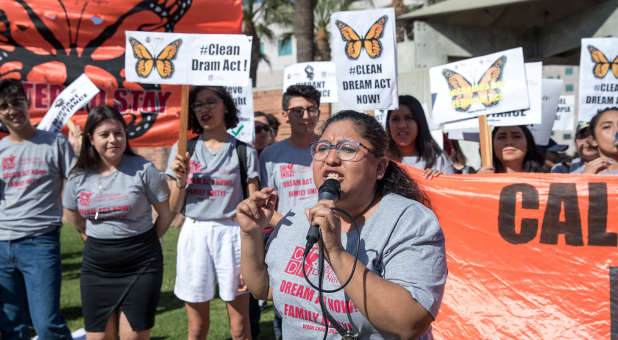Citizenship for DACA Recipients: It’s a Process
With a budget deal under its belt, Congress is looking to tackle the next big issue: immigration.
Senate Majority Leader Mitch McConnell, R-Ky., said the Senate will open up debate on a bill as early as Monday.
In his State of the Union Address, President Trump proposed a bipartisan approach to immigration.
“We presented the Congress with a detailed proposal that should be supported by both parties as a fair compromise,” said Trump.
Part of that proposal includes a path to citizenship for 1.8 million illegal immigrants who were brought to the U.S. when they were children.
But why would he need to?
Why don’t the DACA recipients, who have been in the U.S. for years, just become citizens?
DACA, or Deferred Action for Childhood Arrivals, was a program set up under the Obama administration to give those children protection from being deported.
It did not allow a path to citizenship.
“This is not amnesty, this is not immunity. This is not a path to citizenship. It’s not a permanent fix,” President Obama said in 2012.
When President Trump rescinded DACA last fall, that protection became uncertain.
So why haven’t they done the work to change their status?
According to Immigration Attorney and Consultant Jose Magaña-Salgado, obtaining that legal status is a lot more difficult than people realize.
“Contrary to popular belief, generally, there is no line for undocumented immigrants who have resided in the United States to get in to in order to apply for a green card,” said Magaña-Salgado.
Every undocumented immigrant has a different story—how they got here, who they know in the U.S. and when they found out they were here illegally.
And Salgado says that backstory can make individual cases tricky.
So, what are the options?
Find a Family Sponsor
Undocumented immigrants can have a family member sponsor their green card.
That sponsor must be a U.S. citizen and a member of their immediate family or a spouse.
But even that has a few obstacles.
“The problem is in many cases, because of the nuance of our immigration laws, oftentimes an individual can have someone that can sponsor them,” said Magaña-Salgado, but he added that even in this situation, U.S. laws can put up other barriers.
“Concepts such as the three and 10-year bars, which make it so that someone has to leave the country and prohibits them from coming back for 10 years,” he explained.
In other words, even if someone in the U.S. illegally does get a sponsor, he or she must return to their home country to apply for a green card. But that creates a problem itself, because in most cases it triggers an automatic ban from returning to the U.S. for a certain period of time—often three or 10 years.
But, if an individual doesn’t have a spouse or family member who is also a citizen in the first place, that’s a dead end anyway.
Obtain a Work Sponsor
Employers may feel their employee is worth the investment and sponsor legal status but it’s a costly and complicated process.
Advance Parole
An advance parole is a permit that lets non-citizens re-enter the U.S. after traveling internationally.
According to Factcheck.org with advance parole, an illegal immigrant can leave the U.S. for humanitarian work or for employment purposes. The fee is $575.
When they return they are technically re-entering legally, which is good as far as the green card process is concerned. But they still need one of the aforementioned sponsors.
Think of it as more of a bonus than a golden ticket.
“What happens is if you are an individual who is able to travel on advance parole and also collaterally have someone who can sponsor you, you can potentially apply to get a green card,” explained Magaña-Salgado.
“It’s a series of catch-22s that make it hard to get their green cards,” said Magaña-Salgado.
The immigration issue goes beyond DACA; a comprehensive overhaul has long been discussed, but never accomplished.
The Trump administration wants to see an end to chain migration and the visa lottery program.
It’s something the president mentioned again in his weekly address.
The congressional battle is sure to wage for weeks, as lawmakers begin the lengthy process of fixing a complicated immigration system and showing “heart” to the “Dreamers” as President Trump promised.
Reprinted with permission from CBN.com. Copyright The Christian Broadcasting Network, all rights reserved.















































